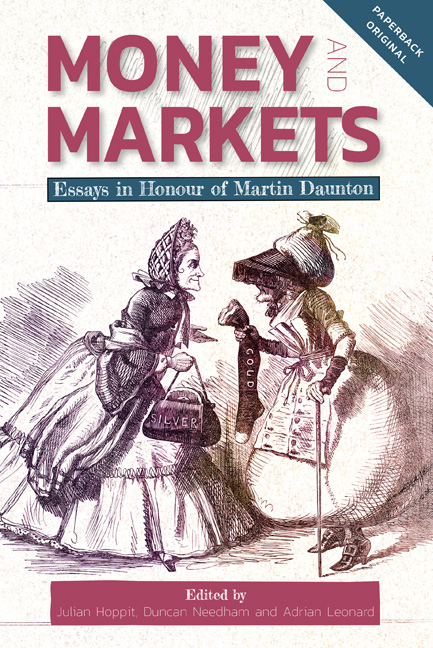Book contents
- Frontmatter
- Contents
- List of Figures
- List of Tables
- List of Contributors
- List of Abbreviations
- Introduction
- 1 Taxing London and the British Fiscal State, 1660–1815
- 2 Rents, Squalor, and the Land Question: Progress and Poverty
- 3 Marine Insurers, the City of London, and Financing the Napoleonic Wars
- 4 The Political Economy of Sir Robert Peel
- 5 Champagne Capitalism: France’s Adaptation to Britain’s Global Hegemony, 1830–80
- 6 The 1848 Revolution in Prussia: a Financial Interpretation
- 7 Imperial Germany, Great Britain and the Political Economy of the Gold Standard, 1867–1914
- 8 Knowledge, Contestation and Authority in the Eurodollar Market, 1959–64
- 9 Continuity and Change in British Conservative Taxation Policy, c. 1964–88
- 10 Britain Since the 1970s: a Transition to Neo-Liberalism?
- 11 Maplin: the Treasury and London’s Third Airport in the 1970s
- 12 Workfare and the Reinvention of the Social in America and Britain, c. 1965 to 1985
- 13 Charity and International Humanitarianism in Post-War Britain
- 14 Discounting Time
- 15 The Material Politics of Energy Disruption: Managing Shortages Amidst Rising Expectations, Britain 1930s–60s
- The Published Writings of Martin J. Daunton
- Index
- People, Markets, Goods: Economies and Societies in History ISSN: 2051-7467
10 - Britain Since the 1970s: a Transition to Neo-Liberalism?
Published online by Cambridge University Press: 13 April 2021
- Frontmatter
- Contents
- List of Figures
- List of Tables
- List of Contributors
- List of Abbreviations
- Introduction
- 1 Taxing London and the British Fiscal State, 1660–1815
- 2 Rents, Squalor, and the Land Question: Progress and Poverty
- 3 Marine Insurers, the City of London, and Financing the Napoleonic Wars
- 4 The Political Economy of Sir Robert Peel
- 5 Champagne Capitalism: France’s Adaptation to Britain’s Global Hegemony, 1830–80
- 6 The 1848 Revolution in Prussia: a Financial Interpretation
- 7 Imperial Germany, Great Britain and the Political Economy of the Gold Standard, 1867–1914
- 8 Knowledge, Contestation and Authority in the Eurodollar Market, 1959–64
- 9 Continuity and Change in British Conservative Taxation Policy, c. 1964–88
- 10 Britain Since the 1970s: a Transition to Neo-Liberalism?
- 11 Maplin: the Treasury and London’s Third Airport in the 1970s
- 12 Workfare and the Reinvention of the Social in America and Britain, c. 1965 to 1985
- 13 Charity and International Humanitarianism in Post-War Britain
- 14 Discounting Time
- 15 The Material Politics of Energy Disruption: Managing Shortages Amidst Rising Expectations, Britain 1930s–60s
- The Published Writings of Martin J. Daunton
- Index
- People, Markets, Goods: Economies and Societies in History ISSN: 2051-7467
Summary
At the close of a chapter analysing the policies of the Thatcher government, Martin Daunton remarks that, in relation to public spending levels, ‘For all her rhetoric, Mrs Thatcher did not roll back the state.’ This statement is an important reminder to us about the need to avoid confusing the rhetoric of politics with the substance of political and policy action. And it is a particularly useful starting point from which to examine the broad claims about the transition in Britain since the 1970s from the predominance of ‘Keynesian social democracy’ to neo-liberalism. This chapter questions the adequacy of such characterisations, focusing especially on the neo-liberal aim of ‘rolling back the state’ and changes in public spending.
The first part deals with the issue of ‘crisis’ and the use of this term to characterise the events of the 1970s. The second analyses ideological and political responses to these events, and what shaped these responses. The third section puts the 1970s into the perspective of subsequent events to see whether indeed what followed this decade shows evidence of a neo-liberal predominance. The final section offers some speculative conclusions.
I
It is uncontentious to see the British economy as ‘in crisis’ in the 1970s. What matters is the nature of that crisis, given that crises are always constructed; accounts of crisis draw on events but require an active process of narration. Section II analyses the way that neo-liberals sought to construct those narratives. This section offers a summary of key economic events around which those narratives were built.
The 1970s did not see a serious crisis of output. The recession of 1974/75 was a mild one in comparison with those of the interwar period and the three that have occurred since. Growth of GDP over the decade was little different from preceding or succeeding periods, but with sharp cyclical movements: a period of clearly unsustainable 4.7 per cent annual expansion, followed by a short-lived recession. Of course to contemporaries the recession came as a major shock after twenty-five years of almost uninterrupted expansion. They were also much exercised by the rise in unemployment. By 1971 the figure was clearly heading towards one million, stimulating a policy U-turn, and the recurrence of that figure in 1975 was also a major basis of criticism of the Labour government's policies.
- Type
- Chapter
- Information
- Money and MarketsEssays in Honour of Martin Daunton, pp. 181 - 198Publisher: Boydell & BrewerPrint publication year: 2019

